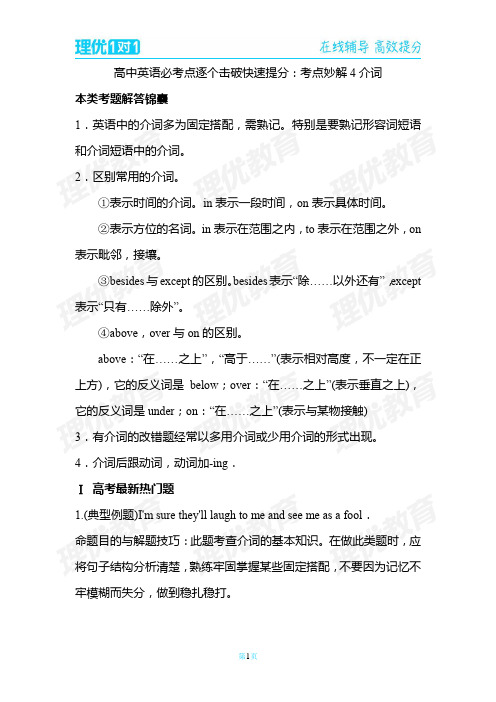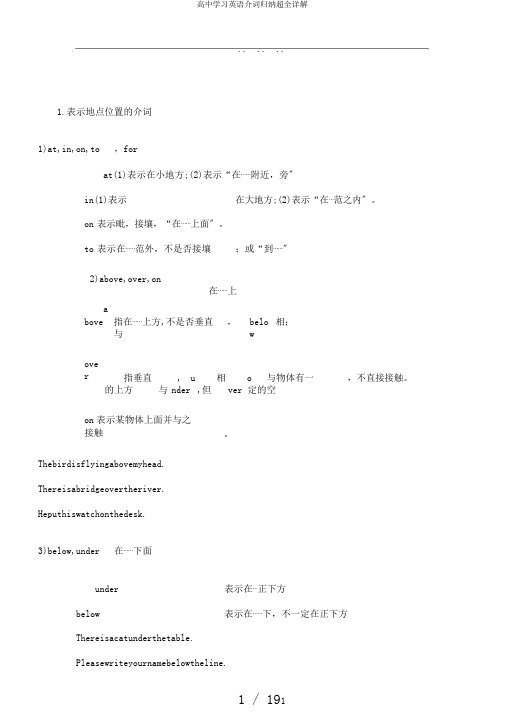高三英语介词4
- 格式:pdf
- 大小:1.66 MB
- 文档页数:14


高中英语必考点逐个击破快速提分:考点妙解4介词本类考题解答锦囊1.英语中的介词多为固定搭配,需熟记。
特别是要熟记形容词短语和介词短语中的介词。
2.区别常用的介词。
①表示时间的介词。
in表示一段时间,on表示具体时间。
②表示方位的名词。
in表示在范围之内,to表示在范围之外,on 表示毗邻,接壤。
③besides与except的区别。
besides表示“除……以外还有”,except 表示“只有……除外”。
④above,over与on的区别。
above:“在……之上”,“高于……”(表示相对高度,不一定在正上方),它的反义词是below;over:“在……之上”(表示垂直之上),它的反义词是under;on:“在……之上”(表示与某物接触)3.有介词的改错题经常以多用介词或少用介词的形式出现。
4.介词后跟动词,动词加-ing.Ⅰ高考最新热门题1.(典型例题)I'm sure they'll laugh to me and see me as a fool.命题目的与解题技巧:此题考查介词的基本知识。
在做此类题时,应将句子结构分析清楚,熟练牢固掌握某些固定搭配,不要因为记忆不牢模糊而失分,做到稳扎稳打。
【答案】to→at.laughat sb,固定词组,取笑某人。
2.I particularly enjoyed driving through the countryside with you and saw the changing colors of the leaves on the trees. 答案:saw→seeing.seeing作enjoyed的宾语。
3.The main problem I was in that I always thought in Chinese and tried to translate everything into English.答案:去掉that前的in. was后接表语从句,不用介词。


高考英语常用介词的分类及用法【导语】要想在高考的英语考试中获得好成绩,就一定要掌控好英语介词的用法,这样才可以在高考的原因考试中国发挥的更加杰出。
下面是作者为您整理的高考英语常用介词,期望对您有所帮助!高考英语常用介词(一) 介词的句法功能:介词不能独立在句中做成份,介词后必须与名词、代词、或动名词构成介词短语在句中充当一个成份,表示人、物、事件等与其它人、物、事件等之间的关系。
1、作定语: The book on the table is mine.2、作状语: have breakfast at seven. We (表时间)Theywere late for meeting because of the heavy ; rain.(表原因) ;They started the machine by pressing the button.(表方法)3、作表语: My dictionary is in the bag.4、作宾语补足语: I found him in the office.(二) 1.表示时间的介词(1) in表示“在某一时间段”或“在某一时候”,如用在月、季、年份、时期、世纪等时间名词的前面,或用来泛指一天的某一段时间。
in也能够指“在……之后”,表示从说话起的若干时间内。
如: in July/summer/2000/ancient timesThe bus will be here in ten minutes.(2) on表示“在特定的某一天”,也可用于带有修饰语的一天的某个时间段之前。
如:on Saturday, on Saturday morning, on the morning of August 1st(3) at表示“在某一时间点”,或用来表示不肯定的时间和短时间的假日、时节等。
如:at six o'clock, at Easter(4) over, through (out)两者均指“经过的全部时间”。


.. .. ..1.表示地点位置的介词1)at,in,on,to ,forat(1)表示在小地方;(2)表示“在⋯⋯附近,旁〞in(1)表示在大地方;(2)表示“在⋯范之内〞。
on 表示毗,接壤,“在⋯⋯上面〞。
to 表示在⋯⋯范外,不是否接壤;或“到⋯⋯〞2)above,over,on在⋯⋯上above指在⋯⋯上方,不是否垂直,与below相;over指垂直的上方,与under相,但over与物体有一定的空,不直接接触。
on表示某物体上面并与之接触。
Thebirdisflyingabovemyhead.Thereisabridgeovertheriver.Heputhiswatchonthedesk.3)below,under 在⋯⋯下面under 表示在⋯正下方below 表示在⋯⋯下,不一定在正下方Thereisacatunderthetable.Pleasewriteyournamebelowtheline.. 专业资料可编辑... .. ..4)infront[frant]of,inthefrontof 在⋯⋯前面in front of⋯意思是“在⋯⋯前面〞,指甲物在乙物之前,两者互;其反是不包括behind〔在⋯⋯的后面〕。
Therearesomeflowersinfrontofthehouse.(房子前面有些花卉。
)inthefrontof意思是“在⋯..的前部〞,即甲物在乙物的内部.反是at theback of⋯〔在⋯⋯范内的后部〕。
Thereisablackboardinthefrontofourclassroom.我的教室前有一黑板。
Ourteacherstandsinthefrontoftheclassroom.我的老站在教室前.(老在教室里)5〕beside,behindbeside 表示在⋯⋯旁behind 表示在⋯⋯后面本段2.表示时间的介词1)in,on ,at在⋯⋯in表示,如世、朝代、代、年、季、月及一般〔非特指〕的早、中、晚等。
入舵市安恙阳光实验学校考点04 介词和介词短语高考频度:★★★★★介词在英语中比较活跃,在高考中,对介词的考查主要集中在语法填空和短文改错题型中,考查点为常见介词如,from,to, on, in, with, by, at, of , on 等等的基本用法上。
语法填空中介词的考查形式为非提示词型,短文改错中介词的考查包括介词的误用以及多词少词。
预计2021年高考对介词的考查将不再局限于单个介词,将会更加注重对介词基本用法和固定搭配中的介词的考查。
在短文改错中,主要考查对介词的误用。
【复习建议】1. 掌握主要介词的常见用法及易混介词的辨析;2. 掌握介词与其他词所构成的一些固定短语;3. 掌握在定语从句中介词的使用情况。
介词的分类考向①介词短语的功能介词不能在句中做成份,介词后必须与名词、代词、或动名词构成介词短语在句中充当一个成分,表示人、物、事件等与其它人、物、事件等之间的关系。
考向②常考介词的辨析1.表示相同或相似概念的介词(短语)的区别1.(2020·新课标I 卷短文改错)After that I poured oil into a pan and turnedoff the stove , I waited patiently unless the oil was hot.【答案】将off 改为on【解析】考查介词。
句意:之后我把油倒进一个平底锅,然后开火。
根据I poured oil into a pan 及常识可知,把油倒进锅里后应是打开炉子,所以此处应使用短语turn on ,故将off 改为on 。
2.(2020·天津卷单项填空)For my fifth birthday, my mother baked me a cake ______ a monkey.A .in the shape ofB .beyond the reach ofC .at the mercy ofD .on the side of 【答案】A【解析】考查介词短语辨析。
表示时间和日期的介词1.in用在表示年、季节、月份,或泛指上午、下午或晚上的名词前;on用在表示某一天,某一天的上午、下午或晚上的名词前;at用在表示某一时刻或时间上的某一点的词前。
2.for后接“一段时间”,表示某事持续多久,多与完成时连用;during表示“在……期间”;through表示“一直……,自始至终”。
3.from,since;from表示时间的起点,意为“从……”,多用于“from...to/till...”中;since表示“自从……以来”。
注意:for和since都常与完成时连用,但for接时间段,since接时间点。
如for two hours(持续)两小时;since last week从上周直到现在。
4.before,by,till,untilbefore指“在……之前”,与after相对。
by指“不迟于,到……时为止,在……以前”,by后接过去时间,常与过去完成时连用;by后接将来时间,常与将来完成时连用。
till(until)“直到……为止”,在肯定句中,till/until必须与延续性动词连用;在否定句中,till/until常与非延续性动词连用。
5.after,inafter+一段时间:表示“在……之后”,用于一般过去时;但时间为点时间时,只能用after,即after+点时间,用于各种时态。
in+一段时间:表示以说话时为起点一段时间之后,与一般将来时连用;但表示“在……之内”时,用于各种时态。
表示方位的介词1.on意为“在……的上面”;over意为“在……(垂直)的正上方”;above意为“在……(不一定垂直)的上方”;under意为“在……(垂直)的正下方”;below意为“在……(不一定垂直)的下方”;near意为“在……附近”;next to意为“紧挨着……”;round/around意为“在……周围”;by意为“在……旁边”;along表示沿着街、路、河岸等;across主要表示从某物的表面“横过”,涉及“面”的概念;past 意为“从……旁经过”;up表示向上,由南到北,由西到东,由沿海到内陆,由小地方到大地方,由农村到城市,反之则用down;through指从某物的内部“穿过”;over指“越过”某一障碍物。
高考必考语法精讲精练语法专题四:介词介词又叫前置词,是一种虚词。
它是高考必考点之一。
I.介词分类:II. 常用介词区别:III.高考英语短文改错及语法填空考点分析及训练·介词考点规律分析:短文改错对介词的考查主要涉及在及物动词后接宾语时误加介词和在不及物动词后接宾语时漏加介词、可直接用作状语的副词短语前误加介词、介词与其他词的常用搭配、常用介词的基本用法、习语中的介词用法等。
语法填空主要涉及介词的选择。
介词单句改错之真题训练:1. Bill insisted in staying near the car.2. Suddenly we caught sight at a car and some men.3. When I have free time I go a long walk.4.When they came down the police were angry to them.5. Most people can quickly get for help from a doctor or go to a hospital since they are ill.6. …and some books, for example, books for history, science, cooking and gardening are also popular.7. I never knew about a ride down a river could be so exciting.8. It was very kind for them to meet me at the railway station.9. In fact, they are planning to visit China in next year.10. We practise for three times every week.11.We must keep in mind that we play for the team instead ourselves.12. Unfortunately, there are too many people among my family.13. I was happy with any programme but the others spent a lot time arguing…14. Thanks very much on inviting me to your birthday party on Sunday.15. So I’m really sorry that I won’t be able to come in this time.16. …but we do not seem to ge t much time to talk about together.17. For instance, on one night he played strong and loud music till four o’clock in the morning.18.I was so tired that I fell asleep at the moment my head touched the pillow.19. His parents asked him to spend in more time preparing for the college entrance examination.20.I feel sorry to him.21.Because so much viewing, children may not develop the habit of reading and the ability to enjoy themselves.22. On one year the average child will see 25,000 television c ommercials…23. The main problem was in that I always thought in Chinese…24. I’m sure they will laugh to me and see me as a fool. So I feel unhappy every day.25. You can find all kinds information in just a few minutes on the Internet.26. But I hav e spent lots my money, …27. …you will probably want to join in the Stamp Collectors’ Club…28. We have a lot on common and have a lot to talk about.介词单句改错之模拟训练:1. We must serve for the people heart and soul.2. I followed the man for a while, and saw him enter into the bank.3. Soon the nurse married with my friend Jim.4. I took a great many of photographs in the mountains.5. In English class, we often talk each other in English.6. Don’t talk. What the man says is well worth listening.7. The chair looks hard, but it is comfortable to sit.8. She was very kind and insisted lending her car to us.9. I asked to her what she would be doing on Saturday.10. Are you glad to be going to back to school?11. On his way to home, he met one of his old friends Jack.12. Please close the door at next time you come in.13. Thousands of people go to the seaside in every year.14. We can finish the work either this week or in next week.15. We walked down the stairs instead taking the elevator.16. We could not have heard them because the noise from the river.17. Don’t be angry to me for not having written—I was really too busy.18. I’ve read a lot books about animals.19. He invited us to dinner, which was very kind for him.20. I knew that there was no hope on the moment I saw him.21. Don’t go by plane. It’s a lot of more expensive.22. Except milk and cheese, we all need vegetables.23. On my way back, I called at Mr Smith at his office.介词单句改错之提升训练:1. His father has been ill on bed for two years.2. During the summer vacation, he worked in the farm.3. He is very fond of football and he is in the school football team.4. I have made rapid progress under the help of my teacher.5. Don’t read under the strong light.6. The killer ran away to the direction of Beijing.7. He lives on No.124. Wuyi Road.8. He is very angry to his son for his failing in the exam.9. He hit me on the face.10. He is strict to me in my work.11. The bottle is filled of the gas.12. London stands to the Thames.13. His mother took pride of his great achievements.14. There are two windows on the wall.15. On the way home, I found I had lost the key of the door.16. We are trying to find the answer of the problem.17. You are required to write your story with your own words.18. With what language did she make the speech?19. He is the cleverest in all the students.20. At a clear night, he went out in search of the gold.21. He had an English party at Christmas Eve.22. Women should be equal with men.23. He is blind on both his eyes.24. Uncle Tom is famous as his skill in cooking.25. He will come back after five weeks.26. He said that he had met us many years ago.27. He is the tallest between the four of us.28. I called on my uncle’s last night.29. It is very clever for a dog to save its owner.30. You should be beware to dangers.介词单句语法填空之真题训练:1.That young man is honest,cooperative,always there when you need his help. ______short,he’s reliable.2.In addition ________ the school,the village has a clinic,which was also built with government support.3.The dictionary is of date:many words have been added to the language since it was published. 4.My connection with pandas goes back ________ my days on a TV show in the mid-1980s. 5.My uncle says that he never dreams _______becoming rich in a short period of time.6.Most of us are more focused_______our tasks in the morning than we are later in the day.7.Are you interested ________ becoming a musician and getting a recording contract(合同)?8.Five years ago, when I taught art at a school in Seattle, I used Tinkertoys as a test ________ the beginning of a term to find out something about my students.9.Chopsticks are not used everywhere in Asia.In India, for example, most people traditionally eat________their hands.10.Now I am leaving home __________ college.At last, I will be on my own, but I still want to have my parents to turn to whenever I need help.11.In high school, I became curious ________ the computer, and built my first website.12.Find an issue you are interested in and learn more.V olunteer or, if you can, contribute a little money ________a cause.13.The mother continued to care for the young panda________more than two years.14.Parents should actively urge their children to take advantage________the opportunity to join sports teams.15.Shelly-Ann is a little woman ________ a big smile.She has mental toughness that did not come about by chance.16.The Scottish girl ________ blue eyes won the first prize in the Fifth Chinese Speech Contest.17.Jane is in a hurry because the train to the airport leaves ________ half an hour.18.Human life is regarded as part of nature and, as such, the only way for us to survive is to live ________ harmony with nature.19.The whole team count ________ Cristiano Ronaldo, and he seldom lets them down.20.Many of the things we now benefit from would not be around but ________ Thomas Edison.21.Have you ever heard of the trees that are homes ________ animals both on land and sea?22.Most people work because it's unavoidable._______ contrast, there are some people who actually enjoy work.23.We tend to have a better memory for things that excite our senses or appeal _____our emotions than for straight facts.24.These comments came in response_____ specific questions often asked by local newsmen.25.This meeting room is a non-smoking area.I would like to warn you _____ advance that if you smoked here you would be fined.学习札记:_______________________________________________________________________________ _______________________________________________________________________________ _______________________________________________________________________________ ____________________________________________________________参考答案及解析介词单句改错之真题训练:1.in 改为on,insist on 为固定搭配2.at 改为of,catch sight of是习语,意为“看见”3.go 后加for,go for a walk 是习语4.to 改为with,要表示对某人生气,英语习惯上用be angry with sb5.去掉for,因其前的get 是及物动词6.books for 改为books on,此处的on 意为“关于”7.去掉about 或将about 改为that,因动词knew 后可直接跟宾语从句,无需用介词8.for 改为of,注意句型It’s kind of sb to do sth9.去掉in,在由next, this, last 等构成的时间短语中,一般可直接用作时间状语,无需加in, on, at 这样的介词10.去掉for,在表示频率的名词前通常不加介词11.instead 后加of,instead of 为复合介词,在此表示“而不是”12.among 改为in,in my family 意为“在我家里”13.a lot 后加of,因a lot 不能直接修饰名词14.on 改为for,thanks for doing sth 意为“因某事而感谢某人”15.去掉in,因this time 可直接用作状语16.去掉about,因about 后没有接宾语,about 属多余17.去掉on,因one night 可直接用作状语18.去掉at,the moment 在此用作连词,相当于as soon as19.去掉in,spend 是及物动词,其后可直接跟名词作宾语20.to 改为for,be / feel sorry for sb 意为“为某人感到难过”21.Because 后加of,因so much viewing 相当于名词22.On 改为In,意为“在一年中”23.去掉that 前的in,was 后是一个以that 引导的宾语从句,in 是多余的24.to 改为at,laugh at 意为“嘲笑”25.kinds 后加of,a kind of 意为“一种……”,all kinds of…意为“各种各样的……”26.lots后加of,lots / a lot后不能接名词;后接名词时,要用lots of…,a lot of…27.去掉in,表示“参加,加入”某个组织,join 后不要再加介词in;表示“参加”某项活动时,才加in28.on 改为in,因为have sth in common 是固定搭配,意为“有共同的……”介词单句改错之模拟训练:1. 去掉for,serve 表示“为……服务”,是及物动词,后接宾语时无需用介词。